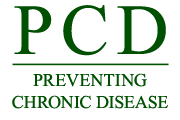PCD News Summary for April 13, 2017

CDC’s News Media Branch releases to reporters the PCD media packet every Tuesday afternoon between 12 and 2 pm.
Embargoed until Thursday, April 13, at 12:00 PM ET
Quit Methods Used by US Adult Cigarette Smokers, 2014–2016
Three out of every four U.S. adult cigarette smokers who tried to quit in the past three months used multiple quit methods during their most recent quit attempt. The three most commonly used methods for trying to quit were giving up cigarettes all at once, or “cold turkey,” reducing the number of cigarettes they smoked, and substituting some cigarettes with e-cigarettes; which was used by about one-third of smokers making quit attempts and was more commonly used than the nicotine patch, nicotine gum, or other FDA-approved cessation aids. Among smokers who tried to quit, one in four reported trying to quit by switching completely to e-cigarettes. However, e-cigarettes are not approved by the FDA as a cessation aid, and further research into the long-term effectiveness of e-cigarettes as a cessation aid is warranted. Quitting cigarette smoking greatly reduces the risk of developing a serious chronic disease. Although the health benefits are greater for people who stop smoking at an earlier age, there are health benefits to quitting at any age.
Darryl Konter
Health Communications Specialist
Idoneous Consulting
Office on Smoking and Health
National Center for Chronic Disease Prevention and Health Promotion
Centers for Disease Control and Prevention
(770) 488-5346
vgg2@cdc.gov
Impact of Comorbidities Among Medicaid Enrollees With Chronic Obstructive Pulmonary Disease, United States, 2009
Comorbidities, the presence of two or more chronic conditions, markedly increased the use of health services among people with chronic obstructive pulmonary disease (COPD) insured with Medicaid. Researchers used nationally representative Medicaid claims data to analyze the impact of comorbidities on disease burden, emergency-department use, hospitalizations, and total health care costs among 291,978 adult COPD patients. Acute care, hospital bed days, and total Medicaid-reimbursed costs increased as the number of comorbidities increased. Researchers also found that emergency-department visits unrelated to COPD were more common than visits for COPD, especially in patients self-identified as black or African American. Hypertension, diabetes, affective disorders, hyperlipidemia, and asthma were the most prevalent comorbid disorders. Substance abuse, congestive heart failure, and asthma were commonly associated with emergency-department visits for COPD. According to the study, COPD-related and non–COPD-related ED visits were more common among women.
Marilyn G. Foreman, MD, MS
Morehouse School of Medicine
404-616-4658
mforeman@msm.edu
###
Note: Not all articles published in PCD represent work done at CDC. In your stories, please clarify whether a study was conducted by CDC (“a CDC study”) or by another institution (“a study published by CDC”). The opinions expressed by authors contributing to PCD do not necessarily reflect the opinions of CDC or the institutions with which the authors are affiliated. PCD requests that, when possible, you include a live link to the article in your stories.
###
U.S. DEPARTMENT OF HEALTH AND HUMAN SERVICES
CDC works 24/7 protecting America’s health, safety and security. Whether diseases start at home or abroad, are curable or preventable, chronic or acute, stem from human error or deliberate attack, CDC is committed to respond to America’s most pressing health challenges.
- Page last reviewed: April 13, 2017
- Page last updated: April 13, 2017
- Content source:



 ShareCompartir
ShareCompartir